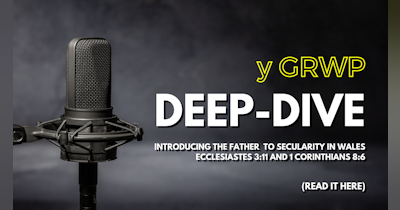- Introduction
Not many people out there in modern Wales would warm - openly - to the idea of worshipping yourself.
It wouldn’t be a good look.
But, then … consider these two things:
- the word ‘worship’ derives from the Old English words weorþ and sċiepe meaning ‘worth’ and ’ship’ … translating as Honour; worship. The state of being worthy; worthiness.
- post-nonconformist, post-Revival era Welsh culture drifted into sining and liberal theology, the first exercising the emotional life of the nation and the second leaving the culture wracked by the impact of moralising without grace and forgiveness …
And those two factors have left much of modern Wales .. especially but not exclusively its indigenous Welsh speaking people … living in an honour-shame culture looking increasingly frantically as secularism accelerated for ways to rescue its honour and mitigate its shame.
In that context, the secular ‘love yourself’ false gospel has stepped into the spiritual gap and has been advocating for its ‘love yourself’ , ‘value yourself’, please yourself and do what’s good for you’ message in increasingly frantic ways.
Why increasingly frantically?
Because t doesn’t work, especially when other people don’t agree very much with the ‘you are so worthy’ message you’re trying to persuade yourself of.
We KNOW we’re not the people we ought to be, and the lac of awareness of and experience of God’s free grace to unworthy people is what we really need … but find initially threatening because it confronts our unworthiness before dealing with it.
Well, against that background I’ve been reading a book on honour- shame cultures … it’s about honour and shame culture overseas, in the origins of ISIS and in a number of other fascinating settings.
But honestly, there is SUCH lot in common with post-1904 Revival Welsh Valleys culture and with parts of the chapel’ (and ‘church’) culture in 21st. Century rural Wales.
And the irony is that so many of the Bible stories that culture is so cognisant with play straight not the Lord’s take on that mind set.
Particularly we can usefully follow this through in the famous parable in Luke 18 about two men who go up to chapel in order to worship … and do so in very different ways.
- 1. The scenario, vv. 9-10
- A) The hearers, v. 9
Luke 18:9 “To some who were confident of their own righteousness and looked down on everyone else”
It’s amazing how those two things go together!
Confidence in your own righteousness seems to fuel itself, manage its insecurities about the assertion of being righteous within yourself … cling to any confidence about itself … by knocking other people down and climbing up on them!
That’s the expression of the inner pharisee we seem to have rioting about with us.
Climbing up on the fallen bodies of others we’ve ‘fell’ is really not going to give you a secure footing in your climb.
It will be hard to keep your footing, especially when you aren’t a confident climber!
But the story Jesus uses to illustrate how insecure that footing is has not one but two men in it, to portray the contrast …
- b) Two men
Luke 18:10 ““Two men went up to the temple to pray, one a Pharisee and the other a tax collector.”
Now, that’s two very different people and while the audience in front of Jesus that day would be cheering for one they’d be jeering at the other … knocking one category of people down to join the other in climbing up over their fallen bodies.
The Pharisees vaunted their supposed self-righteousness ad despised the sin they attributed to the tax-collectors, who had a reputation for profiteering from their alliance with godless foreign oppressors for their personal financial benefit at the expense of there own Jewish people … ‘yah, boo, sucks’.
But - who’d have though it?
These two very differently regarded people in the honour-shame culture of first century Judaism went up to the Temple to pray.
- c) Same Temple
Now … one of those guys was very naturally at home in the Temple.
Honoured there, appreciated there, floating in the warm bath of approval there.
SO much more difficult for the other guy to step into the Temple courts.
The opposite would be true of him.
If you are from an indigenous Welsh background, you know you can step into your ‘own’ chapel, the place where you were sent to Sunday school, grew up, got married, buried your parents and other family members and like you’re in a place you are supposed to be in, where to some extent you fit in and belong.
But when you’re invited to somebody else’s, you feel much more exposed, much more dependent on the hospitality of the person or family that have invited you … it CAN be uncomfortable.
You’re not ‘at home’.
The tax collector going up there is in a far more uncomfortable situation than that but he KNOWS that he NEEDS to find not self-justfication in chapel but is desperate there to find the mercy of God.
And the contrast between both men’s words and demeanour there are crucial.
- 2. Out of the heart the mouth speaks: Pharisee, vv. 11-12
- A) The Pharisee’s stance
Body language is so revealing, isn’t it?
- 11a “The Pharisee stood by himself and prayed …”
Well, it just says that he stood and it’s going to say he prayed to himself … something contemporary translates seem to think inexplicable and not possible … so here he just STOOD and prayed.
He has no compunction in standing in the middle of the temple court wit people all around him displaying his own righteousness in this way.
And before we jeer him because it is our interest to knock people down in our quest to build ourselves up, just think about all the ways we demonstrate our righteousness in our individualistic, performative, Instagram/ Meta/ Facebook culture … to seem similarly keen to be seen by people.
But more significantly, let’s look at this man’s words …
- A) The Pharisee’s words
Luke 18:11-12
“The Pharisee stood by himself and prayed: ‘God, I thank you that I am not like other people—robbers, evildoers, adulterers—or even like this tax collector.
I fast twice a week and give a tenth of all I get.’”
Look how he’s vaunting himself!
Firstly it is competitive: he’s there to diss the tax collector (oh our culture is SO judgemental … and we FEAR that in our honour-shame culture).
Secondly it is performative, demonstrating its claimed righteousness … its self-righteousness:
I fast twice a week
(Religious observance … dressed up tidy to be seen going in a nice car, washed and freshly polished with clean and well-behaved children to chapel on Sunday)
I give tenth of all I get
(Doing sponsored this that and the other activity posted prominently on social media, doing things for the local school, visibly giving to charity, making sure there’s a large number next to your name in the annual Adroddiad from the family chapel ever year …)
And here is the Pharisee publishing on HIS equivalent social media of his day …
Let’s compare the tax-collector.
- 3. Out of the heart the mouth speaks: tax collector, v. 13
Luke 18:13 ““But the tax collector stood at a distance. He would not even look up to heaven, but beat his breast and said, ‘God, have mercy on me, a sinner.’”
- A) The tax-collector’s stance
the tax collector stood at a distance.
He would not even look up to heaven,
but beat his breast.
He senses, recognises and expresses publicly his own unworthiness … no doubt it was uncomfortable but it was authentic … it expressed openly and honesty in that same honour-shame culture as the other guy, where people were absolutely GOING to judge him. The truth about the sins of HIS heart.
And how did he express himself … not praying to himself but genuinely and sincerely to God?
- B) The tax-collector’s words
Luke 18:13 “‘God, have mercy on me, a sinner.’”
‘God’ - he is up in the Temple seeking God not like the other guy who is actually seeking himself.
‘Be merciful to me’ - there is no doubt what he is up at the Temple to get out of it … he’s using the Temple for what it was designed for and set up to do by God (to get mercy for sinners)
‘I am a sinner’ - THAT, not the Pharisee’s words, express honesty, sincerity and integrity in dealing with God.
Now there’s the drama in this story, what’s the point?
- Conclusion - Jesus’s teaching, v. 14
“I tell you that this man, rather than the other, went home justified before God. For all those who exalt themselves will be humbled, and those who humble themselves will be exalted.”
- A) The practical outcome
It’s all to do with being justified or not being justified by God and the clear message is that, Jesus says,
“I tell you that this man,
rather than the other,
went home justified before God.”
Understandable enough, given the first guy the Pharisee wasn’t talking to God at all but praying to himself!
He was so busy justifying himself he wasn’t addressing the question that was the POINT of the Temple of getting righteous in the eyes of God … which was what he needed.
But the other guy - the tax-collector everyone openly despised - displays honesty, integrity and sincerity in seeking God with a plea for the forgiveness that actually both of the men in the story knew deep down that they needed.
- B) The principled reason
Luke 18:15 - “For all those who exalt themselves will be humbled,
and those who humble themselves will be exalted.”
In the words of Mary’s Song … the Magnificat … in Luke 1:52
“He has brought down rulers from their thrones
but has lifted up the humble.”
The bottom line is that the sort of self-exaltation and self-justification our online culture thrives on can be really pretty close to unforgivable sin.
Here’s the principle …
- C) The point to take away
Be like the collector not the pharisee.
The way to deal with that sense of human inadequacy, of not being good enough or even simply not being enough, is common to every human being (who is not diagnosably unwell) wherever you find them on the face of the planet.
We need to ‘OUT’ that fact because not doing so isn’t just bad for our mental health but bad for our enjoyment of life and of eternal life.
One man went home from the Temple that day justified … and it wasn’t the one busy to justify himself.
It was the one who as real about his own realities, knew only God was the One Who was going to fix it for him, and cast himself openly on the mercy of God
And THAT is the very heart of what Jesus came to show us.


